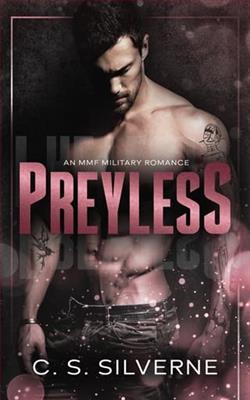Page 7 of Psychotic Faith
"Vigilante?"
He waves a hand. "That's what the press is calling them. The Vigilante of Chicago. Dramatic nonsense, but it sells papers."
We eat in comfortable silence for a while. This is what our relationship has become—weekly dinners where we discuss current events and carefully avoid anything personal. He doesn't ask about my dating life. I don't ask about his work. We exist in parallel, connected by blood and something we never discuss but little else.
"The anniversary is coming up," he says suddenly, surprising us both.
I set down my fork carefully. "I know."
"Will you go to the cemetery?"
"I always do."
He nods, returning to his meal. We don't discuss what happened. We don't discuss why I started studying law on myown, why I spend hours in courthouse records rooms. We just acknowledge the date and move on, two people trapped in amber, frozen at the moment our world shattered.
The walk home from Dad's place takes longer than usual—I keep stopping, looking over my shoulder, wondering if I'm being followed or if I'm just being paranoid. By the time I reach my building, the sun has set and the streetlights cast long shadows that seem to move when I'm not looking directly at them.
My apartment feels different when I return. Nothing's been moved—I've been checking obsessively—but the air seems charged, like the moment before lightning strikes.
I should be terrified. Should be installing new locks, calling the police, staying with Dad until this is resolved. Instead, I find myself standing in my bedroom, speaking to empty air.
"I know you were here."
Silence.
"The Polaroid. The knife. Were you here again today while I was gone?"
Nothing responds, but I continue anyway, feeling foolish and compelled in equal measure.
"Tony didn't come to work. Mr.Patterson didn't come to the library." I touch the fading bruises on my wrist. "My father says there have been bodies. Men with violent histories."
I move to the window, looking out at the city lights. Somewhere out there, someone is watching. Protecting, according to their note.
"I should be scared of you," I whisper to the glass. "Breaking into my apartment, leaving things on my pillow—that's what dangerous people do. Stalkers. Predators."
My reflection stares back, a twenty-four-year-old woman who looks younger than her years, all soft edges and careful smiles. But behind my eyes lives someone else. Someone who's been marking time for half her life, who chose her job notfrom love of books but because information is power. Someone who knows exactly which section holds books on poisons, on untraceable deaths, on how to disappear completely.
"But predators take things," I continue. "They don't sharpen your knife. They don't fix your blanket. They don't remove other threats."
The word 'remove' hangs in the air. Am I really thinking this? That whoever left the Polaroid is connected to Tony's absence, to Patterson's disappearance, to bodies in the news?
It's too large a leap. Too many assumptions. But the photo in my pocket feels like confirmation anyway.
I should be horrified at the thought of someone killing for me. Should be sick at the idea of violence done in my name. Instead, I think of Tony's leering smile, of Patterson's bruising grip, of all the small violences women endure daily.
"I still go to Mass," I find myself saying. "Every Sunday at St.Mary's. I sit in the third pew from the back, left side. I pray for my father's health and for justice and for the strength to be good."
Why am I telling the empty air this? But I can't stop.
"Tomorrow there's story time at ten. I'm reading 'Where the Wild Things Are.' After work, I'll go to the market on Fifth Street, the one that sells fresh flowers. Yellow roses for…." I can't say it aloud.
I'm establishing patterns. Telling my stalker where to find me. This is insane, dangerous, everything they warn women not to do. But the Polaroid in my pocket doesn't feel like a threat. It feels like a promise.
"If you're going to watch me," I whisper, "at least I know you're there."
I get ready for bed methodically—shower, moisturizer, the same routine I've had for years. Mrs.Chen mentioned I look thin today. Maybe I should bring some of my stress-baking cookies tothe library tomorrow. The snickerdoodles from last night's batch turned out perfect. But when I reach for my pajamas, I hesitate. Usually I wear an old t-shirt, something comfortable and shapeless. Tonight I choose differently—a nightgown I bought on sale and never wore, silk that clings to my curves.
I'm dressing for an audience I can't see. The thought should disgust me. Instead, it sends heat through my belly, a flutter of something that isn't quite fear.















